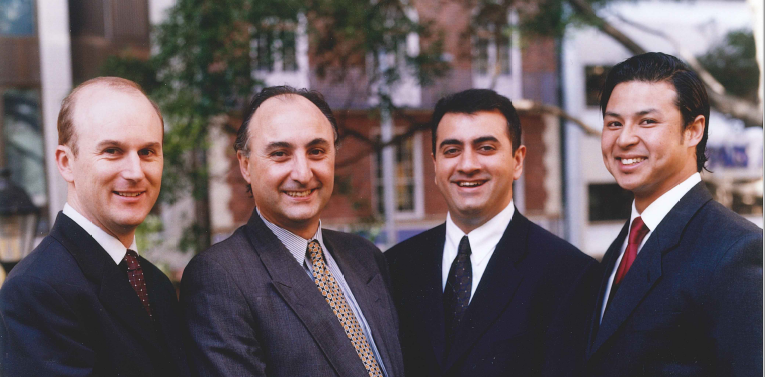IML's secrets to staying consistently ahead for 25 years
25 years is a long time in financial markets. From corporate scandals to the subprime real estate crisis, from meme stocks to the 24-hour news cycle, it can all feel like an eternity.
This month, IML is celebrating 25 years of operating its flagship funds - the Investors Mutual Australian Share Fund and Investors Mutual Small Cap Fund. And that's no mean feat.
To mark the occasion, Livewire was privileged to sit down with Hugh Giddy and Simon Conn, portfolio managers for the respective funds.

I spoke to Giddy last Thursday, whilst my colleague Glenn Freeman spoke with Conn and will be publishing those insights soon.
In the following wire, Giddy and I talk about the enduring elements of the IML philosophy and why it is still relevant today, what has changed over the past 25 years, which companies have been standouts along the way, and what is in store for markets from here.
A little about IML
IML (formerly Investors Mutual) was founded in May 1998 by Anton Tagliaferro – who retired in March this year.
The Australian Share Fund, which is now co-managed by Hugh Giddy and Daniel Moore has returned 9.8% per annum since 1998, after fees - 1.3% above the ASX 300 Accumulation Index while, on average, falling 35% less than the market on months when it falls.
When asked about the enduring element of IML’s success, Giddy talks about the team's non-negotiable trait - a focus on quality companies, and paying an appropriate price.
“There's no point saying something's cheap, because it could be deservedly cheap or not”, says Giddy.
He goes on to point out that the first step is looking at quality, for which IML has its own definition that focuses on reliability and goes beyond simple quantitative metrics which aren’t necessarily enduring.
“What we find enduring are things like a competitive advantage, pricing power, ideally companies that can grow without having to raise money and are not very capital intensive, good balance sheets, good management, good governance, maintaining your social license. They're just a part of the quality framework”.
It is this particular focus on enduring quality that has ensured the IML investment philosophy remains just as relevant today as it did 25 years ago.
And whilst, by their own admission, the IML team will not chase high growth names on silly multiples and can underperform in raging bull markets, ultimately they have proven they can outperform over the long term.
“By focusing on companies that are profitable, that have a good market position, you might miss the odd disruptor. Nevertheless, despite not getting those, you can outperform over time and do so in a defensive way. When inevitably there is a market selloff, a bit of a panic, we have always outperformed in such times”, says Giddy.
Constant refinement
While the underlying philosophy has not changed over the years, Giddy readily acknowledges that the investment process has changed – which is purely a function of refinement and a desire to improve.
The IML team spends considerable time each year focusing on what they can do better, whether it be through information sources, peer review, diving deeper into investment by talking to different parts of a company’s value chain, and eliminating bias.
“A lot of good investing is understanding potential biases", says Giddy
"You don't want to have confirmation bias where you only want to listen to people who've got the same view as you. You don't want to have a recency bias where, because you did well with one idea, another idea that looks the same, it's going to do the same. And you don't want to have a continuous bias against a sector in the market”.
Giddy highlights resources and technology as sectors where views can become entrenched and should continue to be challenged.
“You could say, "Oh well, resources don't have pricing power. The markets just set the price they get, therefore you can't own resources."
“Well, we do own resources but we work out under what conditions should we own a bigger weight and under what conditions should run a lesser weight?
The fallen angels – a gift from heaven
When it comes to stocks that have been long-term contributors to the IML portfolio, Giddy highlights CSL Limited (ASX: CSL), Aurizon (ASX: AZJ), and Brambles (ASX: BXB).
But, more interestingly, he says that his favourite company “if I can find it, is a former market darling” – that is, a great company that has fallen out of favour for one reason or another.
That was the case with CSL, which has proven to be one of the best investments the Fund has made.
Giddy explains that in 2009, coming out of the GFC, investors were more interested in buying recovery plays. CSL, which was still growing at 20% per annum on the EPS line, had tried to buy a competitor Talecris, and the US Justice Department turned them down.
“It was a stock that I don't think IML had ever owned. I don't think any value managers ever really owned CSL because it was this high-growth company and therefore was priced that way. But because they'd raised money to buy Talecris, they had excess cash on the balance sheet, and more shares on issue. So the shares fell below $30 and IML was buying”.
It has since been as high as $340 and is “a 10-bagger” for IML.
.png)
The case for Aurizon is similar to CSL in that externalities created an opportunity to buy a high-quality company at a suitable price.
In the case of AZJ it was flooding, which has affected a lot of the companies that it hauls commodities for.
“A lot of their mine customers haven't been able to haul coal or other mining products. Thermal and metallurgical coal, both in Queensland and New South Wales, because of La Nina, a lot of mines flooded. It takes a while to pump out the pits”.
The other factor Giddy points to is the recent deal to buy One Rail and the subsequent need for AZJ to divest its east coast business in order to satisfy the ACCC.
“They had to sell the acquired east coast rail network in the Hunter Valley to satisfy the ACCC, which they did. But the market wasn't sure that they would. It created an opportunity where a company that had been as high as $6 had come down to below $4. And then as low as low threes - about $3.20”.
As for Brambles, Giddy and the IML team started buying around $6.50 back in 2013/14 and the stock is now north of $14.
“10 years and it's more than doubled and paid dividends in that time. We've had to be a bit patient for a while. The earnings weren't really going anywhere. But now, management's been very focused on generating more cash out of the business, digitising the business, so that they don't lose pallets”.
An example of an investing mistake
Of course, not every investment IML has made over the journey has been a raging success and Giddy points to an investment in Clydesdale Bank (now the rebranded Virgin Money (ASX: VUK)) as one that hasn’t gone to plan.
“We have a belief, and it's proven over time, that spinoffs often do well because they get more attention. NAB (ASX: NAB) spun out its UK bank - Clydesdale.
When it spun out, we thought this has been indemnified against claims by NAB because they had done some product mis-selling that they were having to compensate customers for. But NAB had guaranteed a billion pounds for potential claims. We thought that's all sorted out, and it was a sleepy regional bank. We thought this is pretty safe. Then they decided to merge with Virgin Money" says Giddy.
“In all honesty it's taken a long time for the two banks to come together and do well”.
“Things have turned up but it has to be said, it's been a very disappointing and frustrating journey, and one of those ones of you feel the management over-promised and under-delivered again and again”, he adds.
Downside protection and less volatility
The Clydesdale clanger aside, the IML Australian Share Fund has outperformed over the long term and that is the holy grail for any fund manager.
As well as the outperformance, however, the Fund has been able to deliver those returns with greater downside protection and less volatility than the benchmark.
Giddy attributes the downside protection and lower volatility to a function of the process outlines above.
“It's not like we try and aim for that specifically.
We want to pick good investments and what we consider good investments tend to offer downside protection. One of the elements of that quality we were talking about earlier is reliable, repeatable earnings and cash flows.
“If you stick to finding companies that reliably pay dividends, and have reliable earnings, then the valuation is easier to come to. When markets fall, they normally fall because they've got a little bit overexcited, and over-optimistic. What people sell are the more speculative things. The things without earnings that are more about a good story”.
Giddy provides the following analogy to really hammer home the point:
“We're owning the reliable cars that get you from A to B, not the Ferraris but also not the completely beaten up things that are always breaking down”.
He adds that such companies tend to not go up as much in really strong boom times, but they also don’t down go down much. They're very steady.
Giddy's less-than-giddy outlook
It would have been remiss not to ask Giddy for his outlook on markets, given his personal experience and that of the IML team.
Put simply, Giddy is not overly optimistic about the current market or where it is headed.
“To be honest, I feel that because valuations are high, interest rates have been very low, and we've had too much loose money for a long time, there's a complacency that's crept into investors and into economists about how well we've done not having a recession”.
He adds that we’ve only been able to achieve that outcome with a lot of easy money and government stimulus, which has made consumers spend too much.
“I think it's going to be a challenging environment for companies, which should make it quite a challenging market. I personally would not be that surprised if the market was not up much from where it is now in three years' time”.
Whilst that might sound a bit glass half empty, Giddy adds that it will be a good time for the Fund because it likely means it will be able to establish positions in good companies that become oversold.
“Tough times also mean that the quality companies tend to hold up. I'm excited in that sense. I'm not excited in that I think it's the best time for the economy or stocks. I've seen history. We're at valuation levels that don't really match a normal set of circumstances, of normal interest rates”.
Investing in quality Australian companies since 1998
In this world, risk-taking is often called courage. Not by us. At IML we believe it’s braver, and ultimately more rewarding, to deliberately reduce risk. That’s why we don’t follow the herd into the latest investing fad – we tread our own path.

3 topics
5 stocks mentioned
2 funds mentioned
4 contributors mentioned

